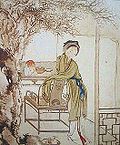- ↑ See Cai Yijiang, 蔡义江:《后四十回没有曹雪芹一个字》; 周汝昌:《流行本《红楼梦》后四十回叙书》--“一百二十回是‘假全本’”。
- ↑ Conspiracy of the Red Mansions, Joel Martinsen,, December 8, 2006 http://www.danwei.org/books/conspiracy_of_the_red_mansions.php, Retrieved February 16, 2011.
- ↑ Eber, Irene (1996). "Riddles in The Dream of the Red Chamber". In Hasan-Rokem, Galit; Shulman, David Dean (eds.). Untying the knot: on riddles and other enigmatic modes. Oxford University Press. p. 237. ISBN 0-19-510856-6.
Sources
- Zhou Ruchang, 周汝昌:《流行本《红楼梦》后四十回叙书》,北京出版社, pp. 307–8.
| Gao E | |||||||||||||||||||
|---|---|---|---|---|---|---|---|---|---|---|---|---|---|---|---|---|---|---|---|
| Traditional Chinese | 高鶚 | ||||||||||||||||||
| Simplified Chinese | 高鹗 | ||||||||||||||||||
| |||||||||||||||||||
| Text and commentaries | |||||||||||
|---|---|---|---|---|---|---|---|---|---|---|---|
| Characters |
| ||||||||||
| Places | |||||||||||
| Sequels |
| ||||||||||
| Adaptations | |||||||||||
Wikiquote has quotations related to Gao E .
